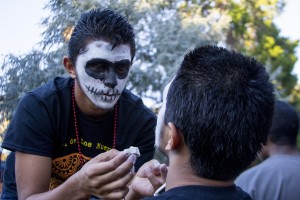
Benjamin Leyva, a freshman criminal justice major, paints faces as part of Día de los Muertos. Skull face painting is a reminder of peoples mortality.Photo credit: Ernesto Rivera.
Spirits of the dead were brought back to life and celebrated Friday for Chico State’s fourth annual celebration of “Día de los Muertos,” which means Day of the Dead in Spanish.
The 12-hour celebration was put on by a slew of multicultural organizations that each celebrated loved ones who have died. The event was put on by Chico State’s Movimiento Estudiantil Chicano de Aztlán, Lambda Theta Phi, the Cross-Cultural Leadership Center, Lambda Sigma Gamma, “La Asosiacion de Teatro y Poesia,” Nu Alpha Kappa, Upsilon Kappa Delta, Gamma Zeta Alpha, Lambda Theta Nu and Lambda Theta Alpha.
It included face painting, a “Día de los Muertos” skit put on by “La Asosiacion de Teatro y Poesia,” a Chico State bicultural theater troupe that explored the history of the holiday, an Aztec dance ceremony performed by Callpuli Tlatekuhtli and its sister organization from Sacramento, a ballet folklorico performance and a night vigil.
The celebration of the dead dates back to the arrival of the Spaniards to ancient Mexico, said Maria Gonzalez, a Spanish professor. The holiday is now celebrated in Mexico by building altars and decorating cemeteries to honor loved ones.
“When the Europeans came and brought their Christian religion, both practices blended together,” Gonzalez said. “They became the celebration of the mestizos.”
November is a fitting month to celebrate the dead, said Eufrasina Romero, a psychology major and member of MEChA.
“The reason it’s held in November is because November in many places is the beginning of the fall season,” she said. “It’s the point when nature begins to die away as well, so it’s a good day to remember those who have died.”
The two-day holiday begins on Nov. 1 with “Día de los Inocentes,” or the Day of the Innocents, which celebrates children who have died, Gonzalez said. The second day, the Day of the Dead, celebrates adults who have died.
“If you see the altars around here, there are some that have ornaments that resemble, remind us, the history of the past,” she said. “You have the skulls that remind us of our mortal lives, someday we will be that skull in the altar or in the cemetery.”
The celebration spreads cultural awareness across campus and reminds people they will not be forgotten after they die, said Andrea Hernández, co-chair of the “Día de los Muertos” committee. Altars are decorated with mementos of dead loved ones and the things they enjoyed, such as food, alcohol and even toys.
“It’s a beautiful idea, the celebration of love, life and death,” she said.
Promoting cultural traditions is crucial at Chico State and is a good reflection of the campus community, Romero said.
“By holding events like this, we’re showing people of diversity and color that they’re being represented here, that they do have somewhere here where their culture is valued,” she said.
Remembering your ancestors is an important part of the tradition, Romero said.
“In a way, it humbles you because it helps you remember that we’re all here because of someone that came before us,” she said.
Ernesto Rivera can be reached at chiefcopyeditor@theorion.com or @ernestorivera on Twitter





